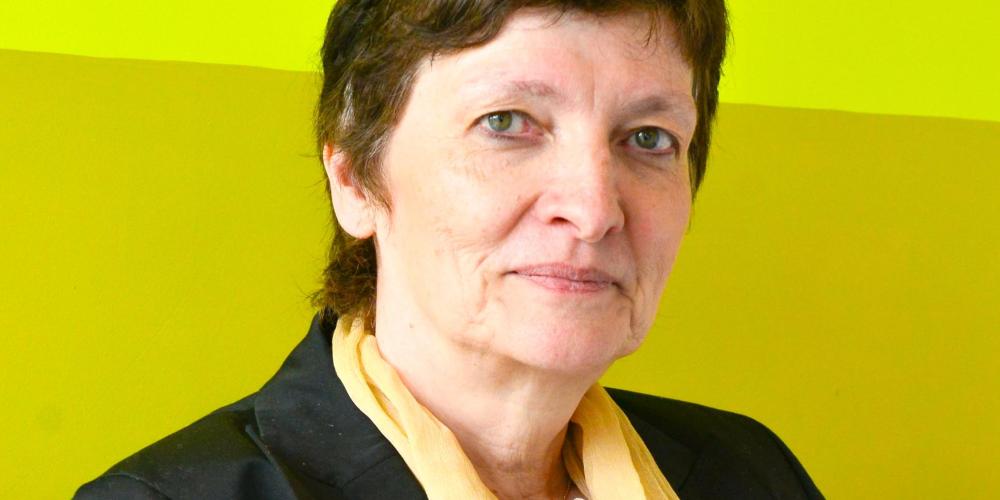
Gambling is a billion-dollar industry with tens of thousands of victims in Flanders alone. Frieda Matthys’ book explores the issue from A to Z. What is the temptation of gambling? Who is susceptible to it? What stages does a gambling addict go through? What role does the industry play? And is escape possible? VUB psychiatrist and former head of psychiatry at UZ Brussel Frieda Matthijs wrote Gokken is geen spel (“Gambling is not a game”) with gambling addiction specialist Ronny Willemen. The book is published in Dutch. Frieda Matthys: “Addiction has always intrigued me.”
Why write this book now?
“Gambling has exploded in the last decade, partly because of the internet ,which means that everyone has a bookmaker’s in their pocket thanks to their smartphone. It’s a multi-billion dollar industry that invests heavily in lobbying to influence regulation and even research. Gambling has also gained a positive image. Where it used to take place in a dingy back alley and was associated with crime, or in casinos as a way to show off your wealth, it’s now become a quasi-normal activity, associated with sports and therefore healthy.”
How big a problem is gambling addiction?
“About 0.6 to 0.7% of the adult population have a real gambling addiction. That may not seem much, but for Flanders that means more than 50,000 people. The number of people who have gambling problems, without a real addiction, who spend a lot of money betting and gambling, is five to 10 times higher. They are at high risk of falling into addiction.”
Can anyone become a gambling addict?
“Some people are more vulnerable than others. Impulsivity is an important factor, but so are problems with stress, anxiety and mood. Young people, who are more impulsive than adults, are at greater risk of falling into the trap, and men more than women. Advertising therefore mainly targets young men.”
“The book includes a short guide to tackling your gambling problem yourself”
Does addiction often co-occur with other mental health problems?
“Yes, in two ways. People with pre-existing problems are more vulnerable. On the other hand, gamblers, precisely because of gambling, develop additional psychological problems such as anxiety disorders and depression. And their suicide risk is five times higher than in someone without gambling problems.”
How can you overcome a gambling addiction?
“Fortunately, a lot of gamblers do manage to stop their gambling without much professional help. For that, it’s important that they realise they have no control over chance, no control over the outcome and there are no magic systems that are going to bring them luck. This also implies that they need to realise they have a problem and accept that they will never recover the money they have lost, which is the reason many gamblers start gambling again. It’s often necessary, especially in the beginning, to secure themselves by, for example, depositing bank cards and getting themselves listed on Belgium’s Excluded Persons Information System or the Dutch Cruks database, so they can no longer access betting shops or gambling websites. The next step is to learn how to deal with risk situations and find alternative fun and exciting activities. The book contains a short guide to tackling your gambling problem yourself.”
“People’s behaviour is determined only to a small extent by their cognition, and mostly by their instincts and emotions.”
Will there ever be a pill for gambling addiction?
“There is little that can be medicated. There are positive results using rTMS (repetitive transcranial magnetic stimulation), though, and for additional, particularly depressive, symptoms, medication can also be helpful.”
Is there enough care for gambling addicts?
“No, there really isn’t. That’s one of the reasons we wrote this book. The problem is often not recognised in primary care. Gamblers and their families are ashamed of it and often other complaints such as depression, insomnia, burnout and suicidal feelings are the first signs. Many addiction specialists don’t feel competent enough to treat gambling addicts. Because there is no drug involved like with alcoholism or drug addiction, they can find it a bit intangible.”
As a scientist, why are you so concerned with addictions?
“Addiction has always intrigued me. People do things that have negative consequences for their health, their relationships, their wallets... and even though they know it, they always get sucked back into it. Knowing is clearly not what matters. Yet the government’s preventive messages focus mainly on that knowing, with messages like ‘Gambling can be addictive. Stop in time!’, ‘Enjoy but drink in moderation’. If people then continue to drink or gamble anyway, it’s their own fault! Meanwhile, adverts focus on what people are really sensitive to: ‘Men know why!’ or ‘Get scandalously rich’. People’s behaviour is determined only to a small extent by their cognition, and mostly by their instincts and emotions. Gaining a better view and grip on that remains an exciting challenge.”